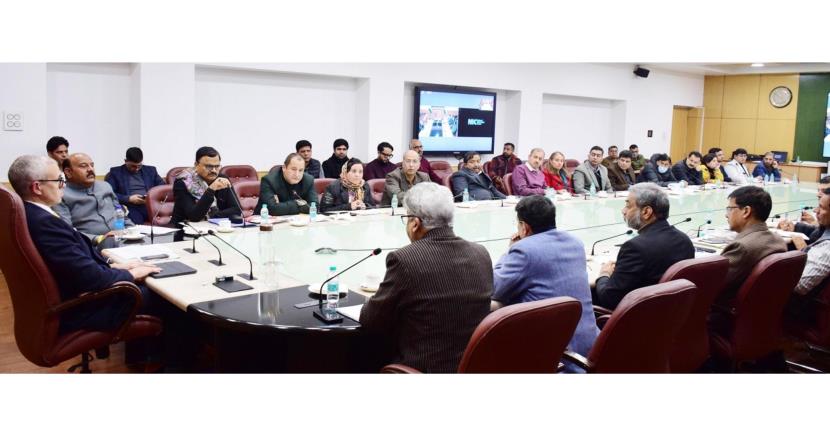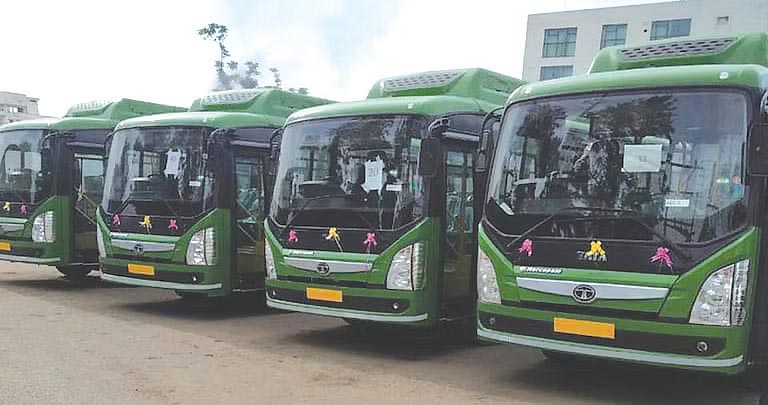Farooq Abdullah has publicly accused Lieutenant Governor Manoj Sinha of stalling government work in Jammu and Kashmir by withholding key administrative files, urging him to act as a facilitator rather than a hurdle.
By: Javid Amin | 03 November 2025
In a sharp public rebuke, Farooq Abdullah, veteran leader of the Jammu & Kashmir National Conference (JKNC) and former Chief Minister of Jammu & Kashmir (J&K), accused the region’s Lieutenant Governor Manoj Sinha of “sitting on files” and thereby delaying government work in the Union Territory. He asserts that such bureaucratic inaction is obstructing public welfare, undermining the elected government and thwarting development.
This article expands on the key dimensions of this unfolding political confrontation: what was said, the context, specific grievances, the broader implications for governance in J&K, and what it signals for the ongoing demand for restoration of statehood. We draw on ground-reporting, statements from involved actors, and the institutional background of J&K’s administration to provide a detailed, accessible and well-grounded narrative.
What Farooq Abdullah Said
Abdullah’s remarks came during his address to media in Jammu, after the resumption of the “Darbar Move” (the seasonal transfer of the Secretariat) to Jammu. His central complaint: the LG’s office is holding up key files, thereby delaying execution of government decisions and inhibiting the functioning of the elected government.
He said: “LG Sinha is sitting on files and stalling our government’s work. He should act as a partner of both the government and the people.”
He continued: “For God’s sake, move the files so that people can benefit.”
Emphasising the role of governance he added: “Governance is not about paperwork gathering dust; it is about delivering service to the people on the ground.”
On the specific matter of the Sher‑i‑Kashmir Institute of Medical Sciences (SKIMS) in Srinagar, he claimed that the LG’s office falsely denied that it had been demoted. “I told him one day that you have demoted SKIMS. He said, ‘No, no, it has got its autonomy.’ It was a complete lie.”
Abdullah also stressed that the LG must behave as “a friend of the people and the government, not as a bureaucratic bottleneck.”
In addition, he reiterated his long-standing demand for full statehood for J&K: “God willing, that too will happen. It will happen soon,” he said, urging Prime Minister Narendra Modi to give special attention to the region’s problems.
Context of the Accusation
To understand the gravity of these remarks, we need to locate them within the administrative and political structure of J&K, and the specific situational backdrop.
Administrative Setup of J&K
Since the abrogation of Article 370 in August 2019, J&K has been administered as a Union Territory with a Lieutenant Governor at the helm, representing the Central government, alongside an elected government (insofar as assembly elections are held) and a Civil Secretariat. The LG’s office retains significant powers, especially in areas of governance, administration and oversight.
The Darbar Move
The timing of Abdullah’s comments is notable: they were made at the time when the Civil Secretariat resumed operations in Jammu after the seasonal Darbar Move. The Darbar Move is a decades-old arrangement in the erstwhile State of J&K in which the administrative headquarters shift between Srinagar (summer) and Jammu (winter). This symbolic exercise embodies the region’s dual-capital tradition and ensures the administrative machinery serves both regions. The return of the secretariat office to Jammu often triggers renewed scrutiny of governance processes.
Specific Allegations and Examples
Abdullah pointed to concrete examples:
-
Files related to project approvals and administrative sanctions remain pending with the LG’s office, rather than being routed swiftly to the implementing departments.
-
In the SKIMS case, which he alleged had been “demoted,” he claims the LG’s denial was false, thereby raising questions of accountability and transparency.
These examples convey not only frustration with delays but a deeper critique: that the LG’s office is acting less as an enabler of governance and more as a bottleneck.
Why This Matters for the Elected Government
For an elected regional leadership like the JKNC, such administrative obstruction is existential: it undermines their ability to deliver developmental outcomes, fulfill electoral promises and maintain the trust of people. In the backdrop of high public expectations in a region marked by past unrest and high developmental need, the perceived blockage in governance carries political consequences.
Abdullah’s remarks therefore amplify a fault line: between the political leadership claiming democratic legitimacy and the bureaucratic administrative apparatus wielding de facto control over files and approvals.
Underlying Dynamics: Why the Accusation Resonates
Beyond the surface exchange of statements, the incident touches upon multiple underlying themes: governance architecture, centre-region relations, statehood demand, and the political tactics of the JKNC.
Governance Architecture and Bureaucratic Bottlenecks
When an LG holds sway over the movement of files, sanctions and approvals, it can create a de facto “single point of delay” in the chain of governance. Even if the bureaucracy and elected ministers initiate action, final clearance bottlenecks can retard implementation. Abdullah’s metaphor of “paperwork gathering dust” highlights this dynamic.
From ground reports, there is growing complaint among departmental officials in Jammu & Kashmir that approval timelines have lengthened post the abrogation of special status, with more files being routed via the LG’s office, thereby slowing down action. While duty failures cannot solely be attributed to one office, political leaders like Abdullah argue the bottleneck is institutional and structurally significant.
Centre-Region Balance and Role of the LG
The design of a Union Territory with an LG means the central government’s representative holds considerable discretionary power. In J&K, this has become politically sensitive: the elected leadership often asserts its mandate and local legitimacy, while the LG’s office (and by extension, the Centre) emphasises administrative oversight and security prerogatives.
Abdullah’s charge that the LG should act as “a facilitator, not a hurdle” speaks to this friction. Critically, when the LG’s decisions are perceived as overriding or delaying the elected government’s agenda, it raises questions about the balance between democratic governance and central administrative control.
Statehood Demand and Symbolic Significance
The demand for restoration of full statehood in J&K is persistent. Since the former State was reorganised into a Union Territory, many regional parties, including the JKNC, have argued that governance deficits and centralised decision-making underscore the need for statehood. Abdullah’s comments link the filing delays with this larger argument: if local governance cannot function due to bureaucratic bottlenecks, then the democratic deficit remains.
By urging the Prime Minister to restore statehood, Abdullah is framing the immediate governance delays as symptomatic of the structural change in J&K’s constitutional status. The rhetoric suggests that delays are not only administrative but also political and constitutional.
Political Strategy and Electoral Implications
From a strategic viewpoint, the JKNC is positioning itself as the champion of good governance and democratic legitimacy, juxtaposed against an LG-led administration which they portray as opaque and obstructive. This message resonates ahead of by-elections in constituencies such as Banihal and Nagrota (which Abdullah mentioned).
By raising public grievances about delays and governance bottlenecks, the JKNC aims to mobilise public opinion and strengthen its electoral appeal.
Specific Case Study: SKIMS and Administrative Delays
One of the focal points of Abdullah’s critique is his allegation regarding the Sher-i-Kashmir Institute of Medical Sciences (SKIMS) in Srinagar. According to him, the LG’s office alleged that the institute had its autonomy intact when, in his view, it had been “demoted”. He stated: “He said, ‘No, no, it has got its autonomy.’ It was a complete lie.”
Why SKIMS Matters
SKIMS is a premier medical institution in J&K, a key referral hospital for the region and a symbol of medical infrastructure capacity. For a region wrestling with health-service challenges — especially in the wake of the COVID-19 pandemic, floods and remote-area access issues — the status of SKIMS is intimately tied to public perceptions of governance.
Implications of Administrative Uncertainty
When a key institution faces alleged demotion or status alteration — and when there is contested communication about its autonomy — it sends signals of institutional instability. Officials facing unclear hierarchy may delay decisions; funding or equipment upgrades may be held up; recruitment and staffing may stall.
Abdullah’s allegation is thus not simply about one file but about how institutional ambiguity at a major public service entity can erode governance credibility. If residents believe that even major hospitals are subject to administrative limbo, confidence in governance suffers.
Verification and Ground Realities
While independent verification of the exact status of SKIMS’s autonomy is beyond this article, multiple local reports corroborate that officials in Jammu & Kashmir have raised concerns about slower approvals, increased oversight and multiple clearances required for even routine decisions. Abdullah’s public accusation gives political voice to such persistent bureaucratic grievances.
Broader Political Implications
The immediate spat between Abdullah and the LG reflects deeper currents in J&K’s political landscape. Below, we explore the broader implications across governance, politics, constitutional status and public perception.
Governance and Delivery Deficit
If administrative delays are systemic, the immediate fallout is on the ground: delayed infrastructure projects, stalled schemes, frustrated citizens and lower public trust. When files accumulate, funds remain unutilised, projects linger in “approved but not started” limbo, and services are impacted. The commentary by Abdullah emphasises that “service to the people” is at stake.
In a region like J&K, where development deficits — in connectivity, health, education and livelihood diversification — are significant, efficient governance has heightened symbolic and practical importance. Thus, these accusations carry not only political weight but also service-delivery implications.
Centre-State Dynamics and Autonomy Concerns
Abdullah’s remarks tap into a narrative of democratic autonomy and local control: that the locally elected government must not be overshadowed by centralised bureaucracy. The LG’s dual role — as part of the administrative apparatus and as a stand-in for the central government — means the interplay is delicate.
By accusing the LG of “interfering” and delaying files, Abdullah is signalling that there is a deficit of trust and functional independence in the region’s governance architecture. This sets up a broader discourse about how much executive discretion the LG should wield and how much autonomy the regional government should exercise.
Statehood and Constitutional Questions
The demand for restoration of statehood is not new. However, when governance anomalies — like alleged delays in files — are raised as symptomatic of structural deficits, they give renewed urgency to the statehood argument. If the argument is: “We cannot govern effectively because our machinery is over-controlled,” then the narrative becomes one of democratic deficit.
Abdullah’s exhortation to the Prime Minister to restore statehood underscores that the governance issue is being tied to constitutional status. The implication: until statehood (and full legislative/administrative control) is restored, such bottlenecks will persist.
Political Messaging and Electoral Strategy
From the JKNC’s perspective, these remarks serve multiple strategic functions:
-
They highlight a governance grievance that resonates widely, especially among those frustrated with development delays.
-
They cast the party as defenders of local democracy and service delivery.
-
They put pressure on the LG and by extension on the central government by framing the LG’s office as resistant rather than cooperative.
-
Ahead of by-elections, they amplify the narrative of being the people’s champion.
For the LG’s office and central stakeholders, this poses a reputational risk: administration seen as indifferent or slow could lose political legitimacy, especially as expectations rise among the electorate.
Stakeholder Reactions and Possible Ripples
The LG’s Office
While the LG’s office has not yet issued a detailed public rebuttal to Abdullah’s latest remarks (beyond routine statements), past responses hint at a defensive stance. For example, the LG earlier accused elected leaders of using the “absence of statehood as an excuse” for lack of action.
This suggests that the LG-administration may view the criticisms as politically motivated rather than purely administrative.
Elected Government and Opposition
Abdullah’s remarks place the elected government (and his party) firmly in opposition to the current administrative status quo, even if they are part of the ruling coalition or hold office. It also positions the JKNC as in tension with the LG, thereby setting up a dynamic of conflict rather than cooperation.
Civil Service and Departments
Officials within the secretariat and departments may feel pressure in two ways:
-
On one hand, to speed up actions and reduce backlog of files.
-
On the other hand, to manage their relationships with the LG’s office carefully so as not to be perceived as circumventing proper procedure.
The net effect could be an initial flurry of sprints and approvals, but also potential overload and risk of compromised quality if processes are rushed.
Public Perception
Among the public in J&K — particularly Jammu and Kashmir divisions — this kind of public friction may stir questions of accountability: is the government failing because of internal administrative bottlenecks? Are citizens losing out because decisions are delayed? These perceptions may deepen if services or projects remain stuck.
Why This Will Matter Going Forward
Implementation of Developmental Projects
With major infrastructure, health, education and tourism projects pending across J&K, efficient decision-making is critical. Delays in file movement translate into cost escalations, missed deadlines, loss of investor confidence and frustrated beneficiaries. Abdullah’s warning hints at these cascading effects.
Electoral Outlook
Given that by-elections and assembly elections in J&K are politically charged and closely watched, governance narratives will matter. If the JKNC can convincingly claim that it is being obstructed by bureaucratic inertia, it may gain public support. Conversely, if the LG-led administration can show improved delivery, the narrative may shift.
Constitutional and Legal Reform Debates
The governance bottlenecks raised could feed into larger debates about J&K’s constitutional status, administrative reforms, decentralisation and local autonomy. As long as files remain stuck or approvals delayed, critics will argue that the current system lacks empowerment for elected leaders.
Institutional Reform and Bureaucratic Culture
Finally, regardless of political powerhouses, the incident signals a call for institutional reform: more transparent, time-bound file movement, clearer accountability and tighter coordination between ministries, departments and the LG’s office. Without these reforms, development efforts risk being hampered even if policy intent is strong.
Recommendations and Path Forward
Based on the issues highlighted, several recommendations can help improve governance and reduce friction:
-
Establish Clear Timelines: The J&K administration should issue a directive setting standard timelines for file clearances, with escalation paths if delays occur. This will help reduce the “sitting on files” complaint.
-
Digital Workflow and Transparency: Adopting an end-to-end digital file tracking across departments and the LG’s office would allow real-time monitoring of where a file stands, thus lowering opaque bottlenecks.
-
Joint Review Mechanism: A periodic joint review between the LG’s office and elected ministers to lock in priorities, identify stalled files and resolve roadblocks.
-
Institutional Autonomy Assurance: Clarify and publicly reaffirm the autonomy of institutions like SKIMS, universities and regulatory bodies so that disputes about status don’t fuel larger governance delays.
-
Public Reporting: Publishing quarterly “cleared vs pending” dashboards of major schemes would increase accountability and reduce perception of inertia.
-
Dialogue on Statehood: Given that the governance challenge is intertwined with constitutional status, a structured dialogue between the Centre, J&K elected leadership and civil society on statehood/restoration of assembly powers would help address underlying tensions.
-
Capacity Building: Training and sensitising departmental secretariats on modern project-management tools, expedited clearances and citizen-centric orientation may reduce entrenched bureaucratic inertia.
Conclusion
The public accusation by Farooq Abdullah that LG Manoj Sinha is “sitting on files” and stalling government work in Jammu & Kashmir is more than a political headline—it reflects structural fault-lines in governance, democratic accountability and constitutional architecture in the region.
The charge touches upon delayed project implementation, bureaucratic bottlenecks, institutional ambiguity and the larger democratic and constitutional question of local autonomy and statehood. As the JKNC uses this moment to highlight its stand on governance and public welfare, the LG’s administration will face pressure to show delivery and responsiveness.
Ultimately, for the people of J&K — whether in Jammu or Kashmir divisions — what matters is not the public spat but whether governance translates into developmental outcomes, timely public services and visible projects. If file-movement delays continue unchecked, even the best policy intentions may be undermined.
The demand for statehood looms large in this context: Abdullah’s linkage between delayed governance and lack of full state powers signals that unless administrative reform is matched by constitutional empowerment, the region may continue to face a delivery deficit.
As this story evolves, the key question will be: Will the LG’s office facilitate smoother governance, or will delays persist and deepen the trust deficit? For now, the spotlight is on whether files move faster—and whether people of J&K finally feel the difference.



